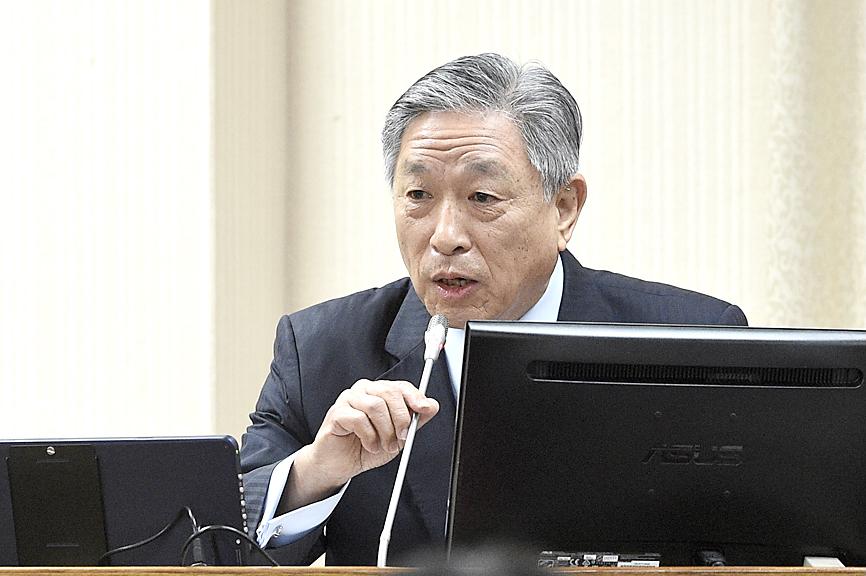Former Japanese prime minister Shinzo Abe might visit Taiwan next year, which the private sector highly anticipates and the government welcomes, Deputy Minister of Foreign Affairs Tien Chung-kwang (田中光) said yesterday.
Tien made the remarks in answering questions from legislators at a meeting of the Legislative Yuan’s Foreign Affairs and National Defense Committee.
Democratic Progressive Party (DPP) Legislator Kuo Kuo-wen (郭國文), chairman of a parliamentary friendship association for East Asia, on Tuesday said that Abe had accepted the association’s invitation to give a lecture at the Legislative Yuan next year.

Photo: George Tsorng, Taipei Times
In September, Abe — Japan’s longest-serving prime minister — stepped down due to health issues and was replaced by Yoshihide Suga.
Asked by other lawmakers to confirm Abe’s visit, Tien said that the government is positive about the plan and welcomes it, even though it has not received formal notice from Abe.
“We know the private sector is very much looking forward to it [Abe’s visit]. The government is also happy to see it happen,” Tien said.
Chinese Nationalist Party (KMT) Legislator Wen Yu-hsia (溫玉霞) asked if Abe’s visit might bring some “good news,” such as inviting Taiwan to join the Comprehensive and Progressive Agreement for Trans-Pacific Partnership (CPTPP).
A visit by Abe would mark a great improvement of bilateral relations, but Taiwan’s bid to join the trade bloc needs the consensus of all of the member states, Tien said.
Asked if Taiwan’s lifting of a ban on food imports from five Japanese prefectures after the 2011 Fukushima Dai-ichi nuclear power plant disaster would be a prerequisite for joining the trade bloc, Tien said that the government would ensure food safety, and follow international and scientific standards in handling the issue.
Wen and KMT Legislator Charles Chen (陳以信) asked why Representative to Japan Frank Hsieh (謝長廷) returned to Taiwan when Chinese Minister of Foreign Affairs Wang Yi (王毅) on Nov. 24 and 25 visited Tokyo and expressed Beijing’s intention to join the CPTPP.
Taking days off, Hsieh returned to Taiwan to attend two important meetings: a board meeting of the Taiwan-Japan Relations Association and a meeting of the Association of Taiwan Kotso Tai Rit Interchange, Tien said.
Hsieh’s attendance at the meetings was an “indirect” effort to facilitate Taiwan’s participation in the CPTPP, Tien said.
Hsieh might have fixed his itinerary before Wang confirmed his schedule, Tien said, rejecting KMT lawmakers’ accusations that the envoy was derelict in his duties.
Other diplomatic staff in Japan monitored Wang’s visit during Hsieh’s absence, Tien said, while agreeing to submit a report to lawmakers on Hsieh’s performance.
Hsieh wrote on Facebook on Sunday that he had returned to Tokyo on that day.

CAUTION: Based on intelligence from the nation’s security agencies, MOFA has cautioned Taiwanese travelers about heightened safety risks in China-friendly countries The Ministry of Foreign Affairs (MOFA) yesterday urged Taiwanese to be aware of their safety when traveling abroad, especially in countries that are friendly to China. China in June last year issued 22 guidelines that allow its courts to try in absentia and sentence to death so-called “diehard” Taiwanese independence activists, even though Chinese courts have no jurisdiction in Taiwan. Late last month, a senior Chinese official gave closed-door instructions to state security units to implement the guidelines in countries friendly to China, a government memo and a senior Taiwan security official said, based on information gathered by Taiwan’s intelligence agency. The

The National Immigration Agency (NIA) said yesterday that it will revoke the dependent-based residence permit of a Chinese social media influencer who reportedly “openly advocated for [China’s] unification through military force” with Taiwan. The Chinese national, identified by her surname Liu (劉), will have her residence permit revoked in accordance with Article 14 of the “Measures for the permission of family- based residence, long-term residence and settlement of people from the Mainland Area in the Taiwan Area,” the NIA said in a news release. The agency explained it received reports that Liu made “unifying Taiwan through military force” statements on her online

Taiwan Semiconductor Manufacturing Co (TSMC), the world’s largest contract chipmaker, said yesterday that it is looking to hire 8,000 people this year, at a time when the tech giant is expanding production capacity to maintain its lead over competitors. To attract talent, TSMC would launch a large-scale recruitment campaign on campuses across Taiwan, where a newly recruited engineer with a master’s degree could expect to receive an average salary of NT$2.2 million (US$60,912), which is much higher than the 2023 national average of NT$709,000 for those in the same category, according to government statistics. TSMC, which accounted for more than 60 percent

Tung Tzu-hsien (童子賢), a Taiwanese businessman and deputy convener of the nation’s National Climate Change Committee, said yesterday that “electrical power is national power” and nuclear energy is “very important to Taiwan.” Tung made the remarks, suggesting that his views do not align with the country’s current official policy of phasing out nuclear energy, at a forum organized by the Taiwan People’s Party titled “Challenges and Prospects of Taiwan’s AI Industry and Energy Policy.” “Taiwan is currently pursuing industries with high added- value and is developing vigorously, and this all requires electricity,” said the chairman